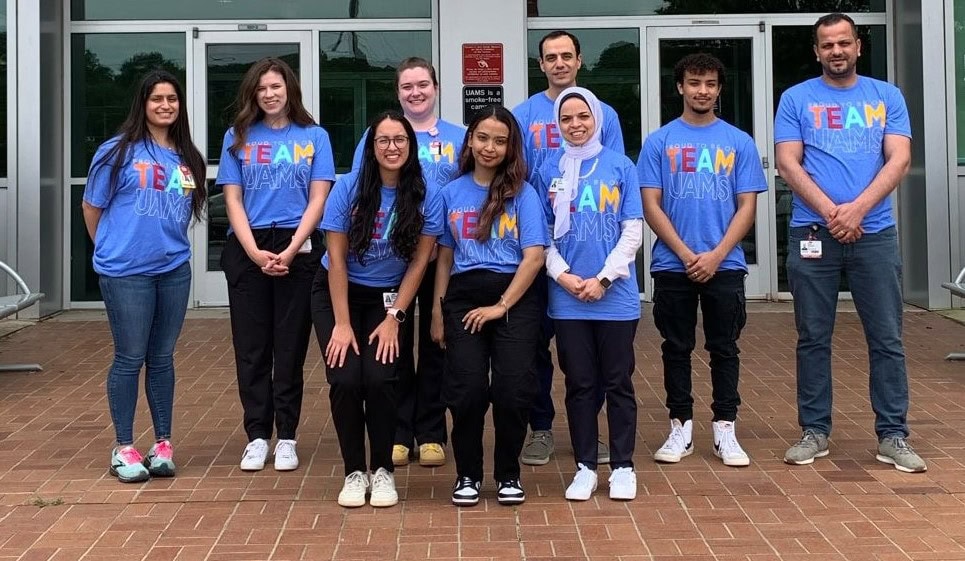UAMS Receives Nearly $2.2 Million Federal Grant to Study Immune Response to Eye Disease
| LITTLE ROCK — The University of Arkansas for Medical Sciences (UAMS) received a five-year, nearly $2.2 million federal grant to study how modulating the body’s immune response may potentially benefit patients with certain eye diseases.
The National Eye Institute (NEI) awarded the grant to a laboratory led by Abdel Fouda, Ph.D., an assistant professor in the Department of Pharmacology and Toxicology in the UAMS College of Medicine. Fouda specializes in studying retinal ischemic diseases, which are common causes of vision impairment caused by a lack of blood flow to the retina. His lab focuses on developing new therapies for ischemic and trauma-induced retinopathy.
The grant allows Fouda’s lab to study the role of a certain type of immune cells, called myeloid cells, in retinopathy. In a process called efferocytosis, myeloid cells engulf, or eat, and remove dead cells as part of the body’s natural immune response. Although efferocytosis is well-documented for various diseases, its impact on retinopathy is largely unknown. Fouda’s initial data shows that efferocytosis could play a beneficial role in treating retinopathy. The project will explore methods of treatment to enhance myeloid cell-mediated efferocytosis, potentially leading to improved injury recovery and better patient outcomes.
“I am very excited that we secured this grant,” Fouda said. “This is the second R-type grant for the lab in just three years. I extend my heartfelt thanks to my team for their hard work and dedication to bring this fund to UAMS.”
Fouda’s grant is an R01 type grant. The National Institutes of Health (NIH), of which the National Eye Institute is a part, issue R01 grants to support specific research projects over three to five years. It is the NIH’s most commonly used grant program.
Fouda’s team consists of Esraa Shosha, Ph.D., assistant professor in the Department of Pharmacology and Toxicology; Rami Shahror, Ph.D., a postdoctoral fellow; and graduate students Carol Morris, Bushra Zaman, and Christian Mitchell.
Ischemia is a key concern for eye health in Arkansas, which has the fourth-highest rate of visual acuity loss in the nation, according to the Centers for Disease Control and Prevention. Diabetes is one major contributor to this issue. Diabetic retinopathy, a condition in which too much blood sugar damages the retina, is the leading cause of blindness in working-age adults ages 20-74, per National Eye Institute data. According to the American Diabetes Association, about 15% of Arkansans have diabetes.
In addition to his laboratory, Fouda has also built a collaborative, interdepartmental research team with the help of Nancy Rusch, Ph.D., chair of the Department of Pharmacology and Toxicology, and Paul Phillips, M.D., director of the Harvey & Bernice Jones Eye Institute. The team meets regularly under Phillips’ leadership to initiate and track collaborative projects.
“Dr. Fouda’s scientific research bridges lab research and clinical care,” Phillips said. “The mechanisms of disease that Dr. Fouda investigates in the laboratory translate to vision-saving medical care for our patients in the clinic.”
“I have been fortunate to be able to quickly grow my National Institutes of Health-funded research team at UAMS, and the collaboration between our two departments has catalyzed this success,” Fouda said. “I am truly thankful for the expertise and contributions of our team members in Ophthalmology, and Pharmacology and Toxicology.”
Research reported in this release was supported with a $2,195,685 grant by the National Eye Institute of the National Institutes of Health under Award Number R01EY035658. The content is solely the responsibility of the authors and does not necessarily represent the official views of the National Institutes of Health.
UAMS is the state’s only health sciences university, with colleges of Medicine, Nursing, Pharmacy, Health Professions and Public Health; a graduate school; a hospital; a main campus in Little Rock; a Northwest Arkansas regional campus in Fayetteville; a statewide network of regional campuses; and eight institutes: the Winthrop P. Rockefeller Cancer Institute, Jackson T. Stephens Spine & Neurosciences Institute, Harvey & Bernice Jones Eye Institute, Psychiatric Research Institute, Donald W. Reynolds Institute on Aging, Translational Research Institute, Institute for Digital Health & Innovation and the Institute for Community Health Innovation. UAMS includes UAMS Health, a statewide health system that encompasses all of UAMS’ clinical enterprise. UAMS is the only adult Level 1 trauma center in the state. UAMS has 3,485 students, 915 medical residents and fellows, and seven dental residents. It is the state’s largest public employer with more than 11,000 employees, including 1,200 physicians who provide care to patients at UAMS, its regional campuses, Arkansas Children’s, the VA Medical Center and Baptist Health. Visit www.uams.edu or uamshealth.com. Find us on Facebook, X (formerly Twitter), YouTube or Instagram.###
